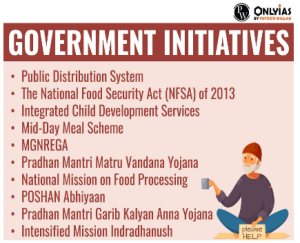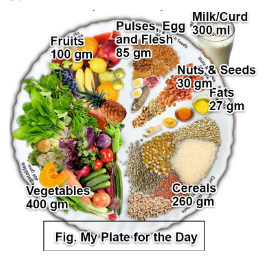Context:
The United Nations food agency has warned of a severe global hunger crisis affecting over 700 million people who are uncertain about when or if they will have their next meal.
More on News: According to World Food Program estimates from 79 countries, up to 783 million people, one in 10 of the world’s population, still go to bed hungry every night.
- Nearly 47 million individuals in more than 50 countries are on the brink of famine.
Global Hunger Index
- It is jointly published by Concern Worldwide and Welthungerhilfe
- It is based on four indicators:
- Undernourishment: Share of the population with insufficient caloric intake.
- Child Stunting: Share of children under age five who have low height for their age.
- Child Wasting: Share of children under age five who have low weight for their height.
- Child Mortality: Share of children who die before their fifth birthday.
- Challenges Associated with GHI:
- Flawed measure: For instance, there is hardly any evidence that the fourth indicator (child mortality) is an outcome of hunger.
- Data Bias: The data source agency (FAO) for the indicator ‘Prevalence of Undernourishment’, has relied on the opinion poll conducted telephonically.
- Wide Disparities: As per National Family Health Survey 5 (NFHS-5) report Child Wasting decreased from 21.0% to 19.3% and Child Stunting decreased from 38.4% to 35.5%. As per GHI 2021 report, child wasting at 17.3% and child stunting at 34.7%, have remained unchanged in 2021 as compared to 2020.
|
-
- This includes approximately 45 million children under the age of five who are currently experiencing acute malnutrition.
- More than 345 million people are facing high levels of food insecurity this year, an increase of almost 200 million people from early 2021 before the COVID-19 pandemic.
India’s Hunger Paradox
- Hunger is usually understood to refer to the distress associated with a lack of sufficient calories.
- According to the Food and Agriculture Organisation (FAO), India is the world’s largest producer of milk, pulses and jute, and ranks as the second largest producer of rice, wheat, sugarcane, groundnut, vegetables, fruit and cotton.
- However, the Global Hunger Report 2022 has ranked India at 107 among 121 countries.
- National Family Health Survey 5: Child Stunting stands at around 36%, wasting at around 19% and there are around 32% children who are underweight at all India level.
Causes of Hunger Crisis:
- Poverty, Unemployment and Underemployment: Many people do not have the means to afford an adequate diet or access to basic necessities.
- Example: A large portion of the population in rural India earns less than the minimum wage, making it difficult for them to afford nutritious food.
- Food Distribution and Supply Chain Issues: Inefficient infrastructure and food distribution systems result in food shortages and higher prices, making food less accessible.
- Example: Downstream bottlenecks in like logistics connectivity and facilities prevents timely delivery of crops increasing their wastage.
Hidden Hunger
- Micronutrient Deficiency or hidden hunger occurs when intake and absorption of vitamins and minerals are too low to sustain good health and development.
- Factors: Poor diet, increased micronutrient needs during certain life stages, and health problems.
- Effects: They can be devastating, leading to mental impairment, poor health, low productivity, and even death.
|
- Population Growth: India’s rapidly growing population can put additional pressure on resources, making it more challenging to provide food and other essential services to everyone.
- For instance, India has overtaken China as the world’s most populous nation according to the UN, but overall agricultural productivity is not keeping pace with population growth.Crop Failures and Natural Disasters: Crop failures due to droughts, floods, or other natural disasters can lead to food shortages.
- Indirect Causes
- Gender Inequality: Women and girls often face discrimination in access to resources and opportunities.
- Lack of Education:This can hinder people’s ability to make informed choices about nutrition and health.
- Caste and Social Hierarchies: Discrimination can limit access to resources and opportunities for marginalized groups.
Challenges:
- Achieving SDG Zero Hunger by 2030: The State of Food Security and Nutrition in the World 2023 report projects that nearly 600 million people worldwide could still be facing hunger in 2030.
 Food Wastage and Losses: It leads to increase in prices and expensive food in 2022 has triggered a global food crisis pushing millions into the trap of hunger, deprivation, and malnutrition.
Food Wastage and Losses: It leads to increase in prices and expensive food in 2022 has triggered a global food crisis pushing millions into the trap of hunger, deprivation, and malnutrition.-
- As per the World Bank, about 222 million people in 53 countries will be experiencing acute food insecurity this year.
- Insufficient Nutrition: According to the UN’s Food and Agricultural Organisation (FAO) ‘The State of Food Security and Nutrition in the World, 2022 Report,, 224.3 million people, or 16 per cent of India’s population, are undernourished with 53 percent of reproductive-age women also being anemic.
- Inequality: There is a significant disparity in food access and nutrition between different regions and social groups in India.
- According to the State of Food Security and Nutrition in the World 2023 report, a staggering 74.1 percent of the population in India cannot afford healthy food.
- Climate Change: Irregular rainfall patterns, droughts, and extreme weather events can disrupt agricultural production.
- Example: Prolonged droughts can lead to crop failures, reducing food availability and driving up prices, making food less affordable for vulnerable populations.
- Lack of Nutritional Awareness: Many people in India lack awareness of proper nutrition and dietary practices, leading to unhealthy eating habits.
Addressing these challenges requires a comprehensive approach and implementing social safety nets and policies that target the most vulnerable populations.
Way Forward:
- Addressing Poverty: The problems of poverty and hunger are interlinked and need a concrete action plan like universal basic income.
- According to the UN, in India the incidence of poverty stands at around 16% in 2019/21.
- Local Governance and Public Distribution System (PDS): For a Hunger-free Village, Gram Panchayat can work to promote breastfeeding of infants, locally available nutritious food and resilient agricultural practices while PDS can integrate diversification of food basket.
- Improving Agricultural Productivity, Food Distribution and Storage: By ensuring scientific usage of water by means of drip irrigation and precision farming, cultivate a healthy environment with mixed crops, crop rotation, and bio fertilizers and using modern techniques like poly houses, green houses, shade houses and others.
 Nutrition Education and Awareness: Public awareness campaigns can educate people about the importance of a balanced diet, hygiene practices, and breastfeeding, etc.
Nutrition Education and Awareness: Public awareness campaigns can educate people about the importance of a balanced diet, hygiene practices, and breastfeeding, etc.
- Example: My plate for the day to prevent hidden hunger is a nutrition awareness poster released by National Institute of Nutrition, Hyderabad.
- Other awareness campaigns include Eat Right Campaign, Right To Food, etc.
- Dietary Diversification: Increasing both the quantity and the range of micronutrient-rich foods such as animal products, fruits and vegetables in adequate quantities
- Other Measures:
- Supplementation: Nutrients are delivered directly to the desired population by means of syrup or pills.
- Food fortification: Addition of micronutrients to processed foods to restore nutrients lost during food processing.
- Biofortification: Enhancing the nutritional properties of crop varieties by using better techniques of plant breeding or genetically modifying the plants.
It is essential to recognize that addressing hunger is a long-term endeavor that requires sustained commitment from all stakeholders, including governments, civil society, and the private sector. Collaborative efforts and innovative solutions are key to making progress in this critical issue and ensuring SDG 2 (Zero Hunger) target is timely achieved.
![]() 16 Sep 2023
16 Sep 2023
 Food Wastage and Losses: It leads to increase in prices and expensive food in 2022 has triggered a global food crisis pushing millions into the trap of hunger, deprivation, and malnutrition.
Food Wastage and Losses: It leads to increase in prices and expensive food in 2022 has triggered a global food crisis pushing millions into the trap of hunger, deprivation, and malnutrition. Nutrition Education and Awareness: Public awareness campaigns can educate people about the importance of a balanced diet, hygiene practices, and breastfeeding, etc.
Nutrition Education and Awareness: Public awareness campaigns can educate people about the importance of a balanced diet, hygiene practices, and breastfeeding, etc.